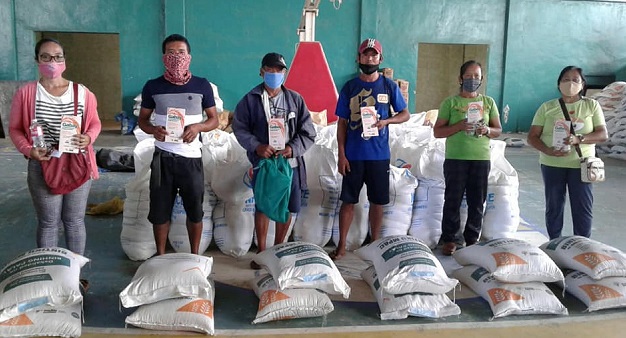
Over 236,000 farmers across the country are benefitting from the 1.2 million bags of certified inbred seeds released to local government units by the Rice Competitiveness Enhancement Fund (RCEF)-Seed Program on its third season of implementation.
“PhilRice in partnership with provincial and municipal LGUs have been working non-stop despite the pandemic restrictions to deliver and distribute the certified inbred seed requirements of farmers listed in the Registry System for Basic Sectors in Agriculture,” said Dr. Flordeliza H. Bordey, RCEF-Seed Program director and deputy executive director of Department of Agriculture-Philippine Rice Research Institute (DA-PhilRice).
In Isulan, Sultan Kudarat, Municipal Agriculturist Roger Villagracia shared that RCEF-Seed Program is the first national agricultural program that entered their conflict-stricken area.
“RCEF beneficiaries in Sitio Baog, Lagandang, Isulan are former rebels. It’s our first time to provide them with agricultural support due to lack of resources. When DA-PhilRice came through the RCEF-Seed Program, we took the courage to implement it as we now have something to give to the marginalized farmers,” he said.
Villagracia further said that more than 5,500 bags were allocated in Isulan for 2021 dry season – the highest number of seed bags granted to their town from a national program.
Meanwhile, Miguel Baclohan of Kananga, Leyte achieved the highest yield in his entire farming years through planting certified inbred seeds and using DA-PhilRice technologies and practices specific for Leyte.
“I used to settle with 75 bags per hectare using either inbred or hybrid varieties. With the seeds of NSIC Rc 216 from RCEF and the technical assistance from PhilRice, I harvested 115cav/ha at 50kg per cav,” Baclohan said.
As of Dec. 6, the program has already reached 900 rice-producing cities and municipalities in 56 provinces. By end of 2021 dry season planting, more than 670,000 farmers are expected to gain from the program.
The program has prioritized distributing seeds of high-yielding varieties, such as NSIC Rc 222, Rc 216, Rc 480, and Rc 160 particularly in typhoon-affected areas in Bicol, Cordillera, and Cagayan regions.
The RCEF-Seed Program allots P3 billion fund every year for the seed requirements of rice farmers and to help farmers produce rice that can compete in the international market. The local government units and lawmakers assist in its implementation.
PhilRice leads the RCEF-Seed Program and is the government’s prime agency on rice research and development mandated to help ensure a rice-secure Philippines. With eight stations across the country, its programs and projects are in line with the DA’s “Masaganang Ani, Mataas na Kita” battlecry. For more information about the Institute’s program, queries can be sent thru PhilRice Text Center (0917 111 7423) or email prri.mail@philrice.gov.ph.




